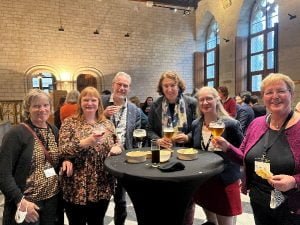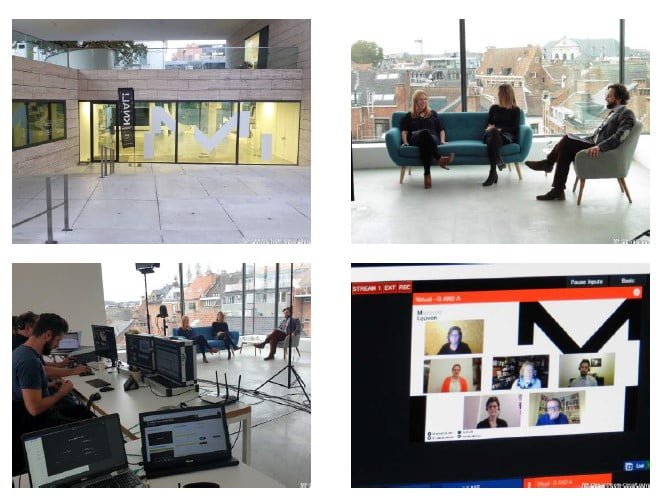ICOM UK member, Jenny Pistella, received an ICOM UK Travel Bursary to attend the ICOM CECA Conference in Belgium. This is Jenny’s report on the ICOM CECA Conference.
Date: Monday 25th – Friday 29th October 2021
Theme: Co-creation inside and outside the museum
Location: Blended digital and onsite conference – online and at M Leuven museum
 The ICOM CECA annual conference 2021 was a fantastic event, brilliant hosted by colleagues from ICOM CECA Belgium. I attended the conference in my role as ICOM CECA national correspondent for the UK. It was the first time since the pandemic that colleagues from CECA were able to meet in person at this blended digital and onsite conference in Belgium and I think it was a successful experiment in offering these two options of how delegates could attend. The theme of this year’s conference was Co-creation inside and outside the museum, with a special focus on how museum colleagues and professionals had engaged with audiences and co-curated content during the pandemic. https://www.mleuven.be/en/icomceca-2021
The ICOM CECA annual conference 2021 was a fantastic event, brilliant hosted by colleagues from ICOM CECA Belgium. I attended the conference in my role as ICOM CECA national correspondent for the UK. It was the first time since the pandemic that colleagues from CECA were able to meet in person at this blended digital and onsite conference in Belgium and I think it was a successful experiment in offering these two options of how delegates could attend. The theme of this year’s conference was Co-creation inside and outside the museum, with a special focus on how museum colleagues and professionals had engaged with audiences and co-curated content during the pandemic. https://www.mleuven.be/en/icomceca-2021
The first two days of the conference took place online, the remaining activities, the following days, were held ‘live’ in Leuven at M-Museum Leuven. M-Museum is notable for its mix of classical and contemporary art in the historic centre of Leuven. The conference was organised by Stéphanie Masuy from the Musée d’Ixelles and Sofie Vermeiren from M-Museum Leuven in collaboration with the ICOM CECA board. Along with talks and workshops taking place onsite in Leuven there was also a day of programmed activities in Brussels and then optional fieldtrip visits to Museums and Cultural venues in Belgium such as Antwerp, Ghent, Mons and Liege. This mix seemed to work really well, with those unable to travel joining the digital conference and then those who were able to travel and meet in person, to get together and join in at the museums.
 Delegates could book tickets for the conference via M-Museum Leuven’s ticketing system, which was very well managed and easy to use. It was possible to access solely the online (first two days) or offline part (next two days) of the programme depending on delegates ability to travel or not due to pandemic restrictions. The online part of the conference was free of charge, but reservation was required. The onsite part of the conference was purposedly kept at a very low rate to make it easier for those travelling from different countries (€150 for 2 days plus an extra €50 for any of the fieldtrips). Sofie Vermeiren, one of the organisers said that they had 510 attendees for the online part of the conference and then 110 attendees for the in-person events in Leuven and Brussels.
Delegates could book tickets for the conference via M-Museum Leuven’s ticketing system, which was very well managed and easy to use. It was possible to access solely the online (first two days) or offline part (next two days) of the programme depending on delegates ability to travel or not due to pandemic restrictions. The online part of the conference was free of charge, but reservation was required. The onsite part of the conference was purposedly kept at a very low rate to make it easier for those travelling from different countries (€150 for 2 days plus an extra €50 for any of the fieldtrips). Sofie Vermeiren, one of the organisers said that they had 510 attendees for the online part of the conference and then 110 attendees for the in-person events in Leuven and Brussels.
Conference activities were organised in the following formats
- Online: Keynote speeches, Themed papers, Research papers, Best Practice presentations, Market of ideas.
- On site: Workshops on applied research, Special interest groups and interactive sessions, Visits to different museums, Presentations and activities in various museums in Belgium, Poster presentations, Best Practice and Research awards ceremony
Some highlights of the programme
- Two keynote speakers: Nina Simon and Pat Villeneuve, explored the various challenges of co-creation and co-curatorial production. Nina Simon is considered a “museum visionary” by the Smithsonian Magazine for her community-based approach to design. She also wrote the book: The Participatory Museum. Pat Villeneuve is a professor and director of Art Management and a Fulbright student in Belgium. She has published and presented extensively on art museum education, visitor-centered exhibitions, systems thinking and paradigmatic change and is currently working with Ann Rowson Love on the Dimensions of Curation Competing Values Framework, a model for promoting intentional curatorial practices.
- The launch of a new collection of CECA publications on the history of museum mediation/education at the national or regional level. The first issue, co-produced with ICOM Belgium, focuses on the rich history of education in Belgian museums presented by Nicole Gesché, Museum educator, ex-CECA secretary, president and ICOM Education editor. This initiative is intended to be successively extended to other countries interested in participating in this project.
- Best Practice Award winning projects with the following nominees: Anne Sophie Grassin, Musée de Cluny, musée national du Moyen Âge , Paris, France | Without eyes: Sound mediation for a synesthetic approach to works of art , Stéphanie Masuy, Musée d’Ixelles, Brussels, Belgium | Musée comme chez soi, Snežana Misic, The Gallery of Maticasrpska, Novi Sad, Serbia | The Young Choose, Arusyak, Ghazaryan Museum of Literature and art after Yeghishe Charents, Yerevan, Armenia | The power of soil, Mauricio André Silva, Museum of Archaeology and Ethnology – University of São Paulo, Brazil
- Interactive workshops organised by the special interest groups presenting their results of the year: results of surveys on the professional profile of educators, an interactive poster on the conditions of inclusiveness, an introduction to evaluation research, exchanges around working in the digital and the inclusion of decolonial practices in museum education, etc.

Evaluation of the blended conference approach
The organisers used the hybr platform for running the digital part of the conference. In terms of technical support and facilitation they worked with Eventronics (they were really great!) and everything was very professional, to a high standard and ran very smoothly. The noticeable benefits of working with this platform and also having a dedicated tech support company assisting the digital delivery was that all speaker presentations were high definition and clear in terms of audio and presentation.
One of the main benefits of the blended conference was that the digital conference was recorded and has been uploaded to the conference platform where you can catch up on sessions you might have missed and take your time after the event to watch and digest content. The digital conference platform was also available in English, Spanish and French, proving more accessible for international colleagues. One consequence I noticed of having a digital and in-person conference in one week was that many delegates decided to travel to Belgium early due to the fear of COVID restrictions and so as a result ended up participating in the digital conference in hotel rooms and other accommodation, which wasn’t ideal. The theme of the conference was “Cocreation inside and outside the museum walls”, which proved to be very pertinent as a topic as many museums education colleagues had had to adapt their delivery from in-person to online due to the pandemic and as a result had turned to audiences to co-produce content digitally or in other ways.
For some of the online content, the organisers used spaces in M-Museum Leuven to host discussions, interviews and presentations. They set up a temporary studio in a beautifully well-lit space overlooking the city, which provided an excellent backdrop for those viewing online and at a later date.
Dissemination and communication
 In terms of sharing my learning from attending the conference
In terms of sharing my learning from attending the conference
- ICOM CECA UK Facebook posts
- ICOM CECA Twitter posts (tagged and included ICOM UK in posts)
- Shared the ICOM CECA conference evaluation and e-newsletter with ICOM CECA members by email and on social media.
Outcomes
Networking with international colleagues – proposed projects
I haven’t been able to run any specific CECA meetings in the UK recently (because of the pandemic but also because I was on maternity leave at the beginning of 2021). I am planning, however on running some events in 2022 in partnership with GEM (Group for Education in Museums). I am currently working with GEM on an International Task Group which I hope to involve CECA UK members in. There are currently 2 CECA members in the group, along with me. The aim of the group is to think of ways that GEM can extend its reach internationally and I suggested that CECA UK could get involved and help. One of the ideas which we’re pursuing is a two-way international mentoring programme that replicates the success of the recent GEM compassionate leadership and mentoring project https://gem.org.uk/our-work/one-to-one/
The proposal is to work with NEMO and CECA, hopefully, to offer UK museum educators a chance to be mentored by international colleagues and vice versa. The ideas are just starting to come together, and I’ll keep CECA updated on any outcomes.
At the conference I was able to do some good networking and talk to international museum educator colleagues about whether they might be interested in this international mentoring project. There were a few who were interested, and I’ve been following up these leads in my discussions with GEM as part of the international working group.
Writing for the new CECA publication on the history of museum education
At the conference I was also approached by some colleagues from the ICOM CECA board about whether I’d be interested in writing something from a UK perspective on the history of museum and heritage education for a new journal/ publication. I would be really keen to work on this with colleagues from CECA and am waiting to hear about how this idea develops.
ICOM UK members can apply for a travel bursary to attend the ICOM General Conference in Prague (Prague 2022) this August, which includes the meetings/conferences of ICOM International Committees.
Booking for Prague 2022 opens on 14 February and the early bird rate is available until 1 May 2022.
ICOM UK travel bursaries are awarded on a first-come-first-served basis. We will shortly announce how many in-person and online bursaries are available for members to apply for and the deadline for doing so. In the meantime, visit the Bursaries page of the ICOM UK website for general information and the application form.

